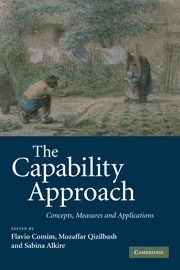Book contents
- Frontmatter
- Contents
- List of figures
- List of tables
- List of contributors
- List of acronyms
- Acknowledgements
- Introduction
- 1 Using the capability approach: prospective and evaluative analyses
- PART I Concepts
- PART II Measures
- PART III Applications
- 12 Democracy, decentralisation and access to basic services: an elaboration on Sen's capability approach
- 13 Reinforcing households' capabilities as a way to reduce vulnerability and prevent poverty in equitable terms
- 14 Capabilities over the lifecourse: at what age does poverty damage most?
- 15 Social policy and the ability to appear in public without shame: Some lessons from a food relief programme in Kinshasa
- 16 The capability approach and gendered education: some issues of operationalisation in the context of the HIV/AIDs epidemic in South Africa
- 17 Women and poverty in Mozambique: is there a gender bias in capabilities, employment conditions and living standards?
- 18 From the quantity to the quality of employment: an application of the capability approach to the Chilean labour market
- Index
- References
13 - Reinforcing households' capabilities as a way to reduce vulnerability and prevent poverty in equitable terms
Published online by Cambridge University Press: 22 September 2009
- Frontmatter
- Contents
- List of figures
- List of tables
- List of contributors
- List of acronyms
- Acknowledgements
- Introduction
- 1 Using the capability approach: prospective and evaluative analyses
- PART I Concepts
- PART II Measures
- PART III Applications
- 12 Democracy, decentralisation and access to basic services: an elaboration on Sen's capability approach
- 13 Reinforcing households' capabilities as a way to reduce vulnerability and prevent poverty in equitable terms
- 14 Capabilities over the lifecourse: at what age does poverty damage most?
- 15 Social policy and the ability to appear in public without shame: Some lessons from a food relief programme in Kinshasa
- 16 The capability approach and gendered education: some issues of operationalisation in the context of the HIV/AIDs epidemic in South Africa
- 17 Women and poverty in Mozambique: is there a gender bias in capabilities, employment conditions and living standards?
- 18 From the quantity to the quality of employment: an application of the capability approach to the Chilean labour market
- Index
- References
Summary
Introduction
Reducing poverty through appropriate strategies is one of the worldwide current major objectives. Helping those who are already poor to escape from poverty usually does this. Preventing the non-poor from falling into poverty – or the poor from getting poorer – when they are confronted with extreme difficulties could also be a supplementary solution. This second perspective is not frequently raised despite the increase of uncertainty and insecurity in a strongly changing world. All countries, in the developing and industrialised worlds, are facing regular internal and external shocks, which have an impact on their populations' standards of living.
Therefore individuals, households and social groups may see their level of living decrease and the risk of poverty traps appear, with long-term consequences on future generations. This raises the issue of vulnerability and makes the search for security a new objective for the present as well as for the future.
Let us define ‘vulnerability’ as the probability of having one's situation worsen when facing a dramatic event. Depending on various factors, this worsening may lead to poverty. Therefore decreasing the level of vulnerability could also be considered as part of poverty-reduction policies. It implies to design preventive ex-ante actions, besides the usual ex-post curative policies. In political terms, such an attitude may also be quite attractive and rewarding, since it corresponds to a reinforcement of the people's global security, which is now emerging as a new social claim.
Information
- Type
- Chapter
- Information
- The Capability ApproachConcepts, Measures and Applications, pp. 421 - 436Publisher: Cambridge University PressPrint publication year: 2008
References
Accessibility standard: Unknown
Why this information is here
This section outlines the accessibility features of this content - including support for screen readers, full keyboard navigation and high-contrast display options. This may not be relevant for you.Accessibility Information
- 14
- Cited by
